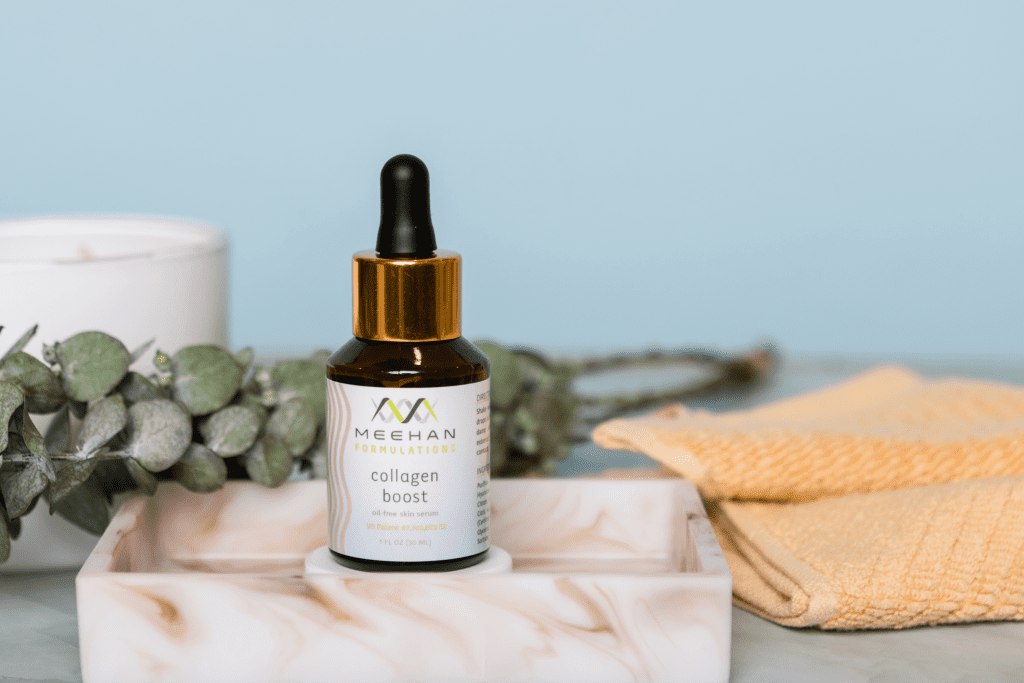I don’t know about you, but I’m doing everything I can to promote longevity and good health as I age. And that includes taking care of my skin. We all know eating well promotes great skin health from the inside, but today we’re going to take a look at my go to vitamin to put on your skin: Vitamin C. It’s essential for longevity and health, but not in the ways you might think. So let’s dive into what makes vitamin C such a crucial vitamin.
Your skin loves vitamin C.
All of the connective tissue in your body is composed of some type of collagen: there are over 28 different types. As we age, our body’s ability to produce collagen decreases, which can lead to aging of the skin, bone deterioration, weakened tendons, ligaments and cartilage, as well as reduced muscle mass. Sounds a bit terrifying, doesn’t it?
To address the basics and get them out of the way, there are two simple pillars of health that can greatly influence how your connective tissues age: quality food and quality exercise. It’s essential that as you age you stick to healthy habits. But you can also take a few extra steps to protect yourself.
Science shows us the best way to support collagen in all your tissues is by providing the building blocks of collagen in forms your body can use. First, let me tell you what it can’t efficiently use: polypeptide chains, marine collagen, bovine collagen, “plant based” collagen, gelatin, etc. Now don’t get me wrong, taking collagen may have general benefits, such as improving your gut health. But for skin health, you need the right components, not already formed collagen. Your body simply can’t direct where it goes after it leaves your digestive tract.
In addition, a great way to improve skin health is delivering peptides (amino acids) right to the skin on a daily basis. This is where vitamin C comes in. It’s critical for the production of collagen: Did you know it binds amino acids together to form the peptide sequences that produce collagen? By incorporating vitamin C into your skincare routine, you can help boost collagen production, which can leave your skin looking firmer and more youthful.
Here’s a list of ingredients which actually improves your skin health when you apply them together:
- Amino acids: L-Proline, L-Serine, and L-Glycine
- Vitamin C (L-Ascorbic acid)
- Copper
- Zinc
Antioxidant protection is a bonus, but collagen production is the real winner.
Vitamin C is an antioxidant that helps protect your skin from oxidative damage caused by free radicals. Free radicals are unstable molecules that can damage cells, which can lead to premature aging. When vitamin C is applied topically to your skin, it neutralizes free radicals and protects against oxidative damage. This can help reduce the appearance of fine lines, wrinkles, and age spots, leaving your skin looking brighter and more even-toned.
Reuse and recycle.
The great thing about vitamin C is that it recycles in your skin, meaning your cells can reuse the vitamin. When your skin absorbs vitamin C, it is regenerated back into its active form multiple times, which allows it to keep working over and over, making it an excellent ingredient to use in either your daytime or nighttime skincare routines. Once you apply vitamin C to your skin, your body knows to reuse it many times over to support collagen health. Pretty cool!

Are you picking the right form of Vitamin C?
When looking for skincare products, it’s important to choose the right ingredients. One of the most effective forms of vitamin C is L-ascorbic acid, which is a water-soluble form. Does your skin care contain L-ascorbic acid? This is the form of C to choose for several key reasons:
Bioavailability! This is the form your skin loves to use. It’s easily absorbed. Look for products that contain a concentration between 10-20% L-ascorbic acid for maximum efficacy.
Don’t be fooled by oxidation! Truth is, oxidized vitamin C works just fine. And in fact, other forms of C, such as Ascorbyl-6-palmitate and Magnesium Ascorbyl phosphate (MAP) which are less prone to oxidation, are much LESS bioavailable to your skin.
At Meehan Formulations, we’re firm believers that vitamin C belongs on your skin, not in a supplement. For the vital functions vitamin C helps with, you need to get about 85-140 mg from your diet. Eat a healthy diet to get your nutritional requirements. Great sources are easy to come by and include include citrus, cruciferous vegetables, bell peppers and even white potatoes (there are lots of other options out there, read more about healthy vitamin C sources).
(Only when we’re supporting collagen growth in the body to do we add trace amounts of vitamin C to any of our formulas).
In large doses, vitamin C is actually harmful to the body – it’s a sugar acid, and it can cause kidney stones. It’s also water soluble, so excess just passes right through you- what’s the point of that, besides wasting money?
Key advice: stick to L-Ascorbic acid for your skin.
Vitamin C is a powerhouse vitamin for your skin health when you know how to use it.
Now that you know the benefits of using vitamin C on your skin, it’s time to start incorporating it into your skincare routine. Whether you’re looking to boost collagen production, protect against oxidative damage, or improve the efficacy of other skincare products, vitamin C can help. Remember, when choosing skincare products, it’s essential to choose the right type to ensure maximum efficacy. Your skin will thank you.
You might like to try Collagen Boost, a simple, lightweight serum with vitamin C, amino acids, copper and zinc.
As always, I love to hear from you. Feel free to comment below. Thanks for reading!